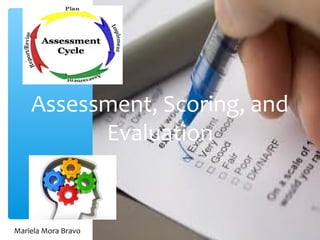This document discusses various topics related to assessment, scoring, and evaluation. It defines key terms like assessment, scoring, and evaluation. It also describes different types of assessments like formative and summative assessments. Additionally, it covers alternative forms of assessment including projects, presentations, and portfolios. The document provides information on assessment validity, difficulty, and ensuring assessments align with learning objectives. It discusses criterion-referenced and norm-referenced evaluation and how assessment data should be recorded and handled.




















